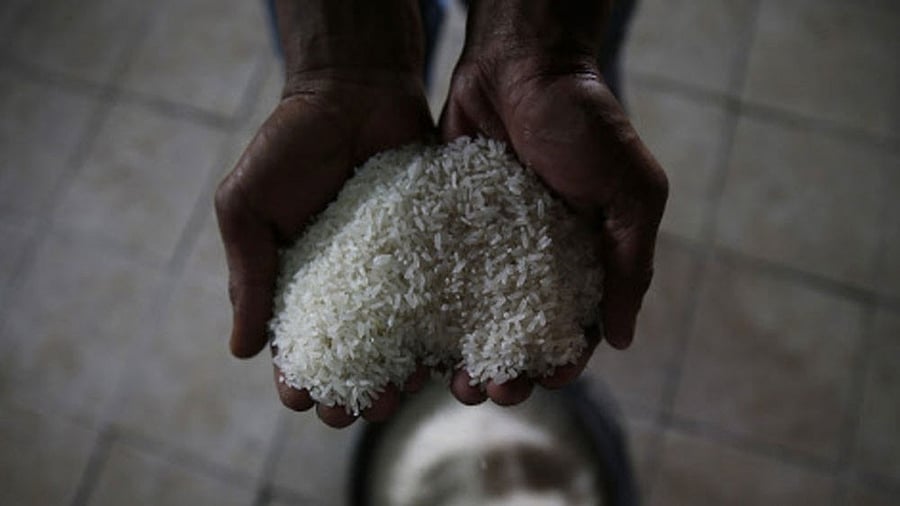
Representative image of rice.
Credit: PTI Photo
Bengaluru: A day after the Centre released two genetically modified (GM) rice varieties, the Coalition for GM-Free India on Monday slammed the "devious" Union government for compromising farmers' rights in favour of the corporate lobby.
The forum was referring to the release of the gene-edited DRR Dhan 100 (Kamala) developed by Indian Institute of Rice Research, Hyderabad and Pusa Rice DST1 developed by Indian Agricultural Research Institute, Delhi. The Indian council of Agriculture claimed that the Kamala variety offers 19 per cent increase in yield while the Pusa rice would need less water and handles stress while providing better yield.
The coalition, which comprises experts and activists from several organisations across the country, said the two varieties were developed by using the SDN 1 technology (a genome editing technique that introduces genetic modifications in a plant's DNA without using external DNA), which was unsafe in the case of rice.
The forum cited a research paper by Sukumar Biswas and 10 other scientists from universities in China and Australia to point out that the SDN-1 technology was imprecise in rice. The paper, they said, stressed the need to monitor the GM variety "for many generations" before introducing it to the field.
"In many cases, they (researchers) found large insertions, deletions and rearrangements of DNA, raising the possibility that the function of genes other than the one targeted could have been altered," the Coalition said, expressing dismay at the release of seeds developed using the same technology though evidence points to gene editing causing genetic changes that are different from those that happen in nature.
Illegal route and farmers rights'
The forum also accused the Centre of taking an illegal pathway to release GM crops, which will eventually have a negative impact on crores of farmers. Gene technology and genetic engineering are governed by rules, which mandate the confined field trials and other procedures before getting clearance from a high level committee.
"However, the government of India (in 2022) deregulated two kinds of SDN-1 and DN-2 giving specious unscientific rationale, and under a smokescreen of higher yield/drought resistance etc., has now released two gene edited rice varieties without any safety testing at all," the Coalition said.
The coalition noted that the gene editing tools are proprietary technologies under the intellectual property rights (IPR) ownership and have a direct bearing on seed sovereignty of India's farming community. "The government of India is compromising farmers' seed sovereignty and our food sovereignty by bringing in technologies entangled in IPR issues," it said.
Further, the forum noted that the unverified yield increases on cereal crops like rice on which India already has surplus production, the monoculture of which is causing severe environmental problems, cannot be the rationale for introducing a risky crop in India's food systems.
Kavitha Kuruganti of the Coalition for a GM-Free India said the gene editing technology was being projected as different from the conventional GM, as something more precise and safe. However, this is not true. "In Europe, for instance, the European Court of Justice (ECJ) ruled in 2018 that genome-edited crops also fall under the extant GM regulations, even if they don't contain foreign DNA," she said.
She said India's move to deregulate the technology in terms of SDN-1 and SDN-2 applications is risky and unsafe. The introduction of the gene-edited rice varieties will also have repercussions for the rice export business. As per official data, India exported 19.86 million tonne of rice in 2024-25 at an estimated value of about Rs 15,500 crore.
"The introduction of GM rice will have an impact on export. Consumer rejection is expected to be high since mandatory labeling in the EU will involve all kinds of genome edited products also, along with other GM products," she added.
DH had earlier reported about the EU sending back about 500 tonnes of rice flour exported from India in October 2021. Such developments, activists have noted, will have a direct impact on farmers.